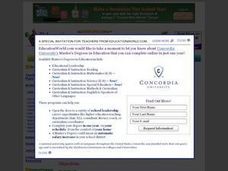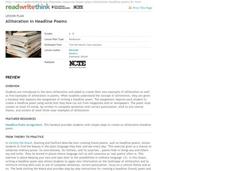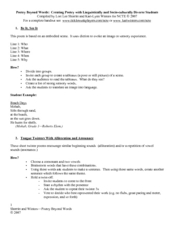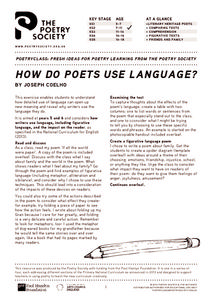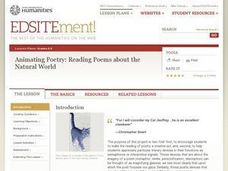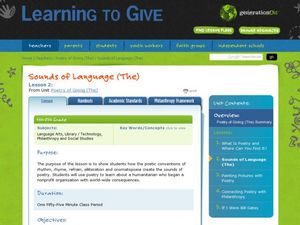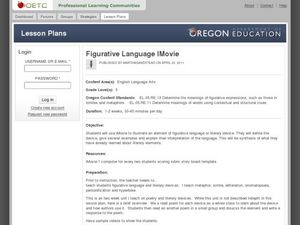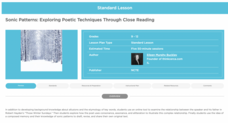Curated OER
Poetry Shopping Spree
Scholars demonstrate the ability to evaluate authors' use of literary elements such as metaphor, simile, personification, imagery, and onomatopoeia. They are provided with a checklist and must shop for poems that contain the poetry terms...
ReadWriteThink
Alliteration in Headline Poems
Poetry is everywhere you look! Create found poems using headlines from newspapers and magazines. Young poetry focus on creating alliterative phrases with words they find in headlines, tying their poems to a central theme.
Poetry4kids
Alliteration and Assonance Lesson Plan
Scholars analyze the poem My Puppy Punched Me in the Eye by Ken Nesbitt in order to locate examples of alliteration and assonance. After reading the poem, alliterative words are underlined and assonant words are circled.
Utah Education Network (UEN)
7th Grade Poetry: Ode Poem
Walt Whitman's "Captain, My Captain" and Robert Frost's "The Road Not Taken" provide seventh graders with examples of odes. After reading and discussing these and other examples, young poets craft an ode and respond to the ode of a...
Manchester University
Alliteration
Kids create cool clauses selecting a single starting sound. Ah, alliteration.
Curated OER
Poetry Beyond Words: Creating Poetry with Linguistically Diverse Students
Models of and directions for how to write 20 different types of poems are featured in an NCTE resource. The introduction to each form highlights the embedded concepts. For example, tongue twisters encourage poets to use alliteration and...
Poetry Society
How do Poets Use Language?
Why do writers choose the language they do? Here's a resource that has the poet himself answer that very question. Joseph Coelho explains why he chose the words and images he used in his poem, "If All the World Were Paper."
National Park Service
The Poet's Toolbox
If you need a lesson for your poetry unit, use two poems by Henry Wadsworth Longfellow ("Rain in Summer" and "The Slave in the Dismal Swamp") and a resource on Elements of Poetry. The lesson plan guides you through activities on...
National Endowment for the Humanities
Animating Poetry: Reading Poems about the Natural World
Students complete poetry analysis activities. In this poetry analysis instructional activity, students consider the use of imagery and sound devices in poetry. Students translate poetry into another art, read a diverse selection of...
National Endowment for the Humanities
The Beauty of Anglo-Saxon Poetry: A Prelude to Beowulf
Riddle me this! What do kennings, caesura, and alliteration have to do with the Nowell Codex? Introduce class members to Anglo-Saxon poetry and prepare readers for a study of Beowulf with a series of activities that includes asking...
Curated OER
The Poetry of Giving
Learn about philanthropy and poetic conventions with an inclusive lesson about Bill Gates. After learning about Mr. Gates' humanitarian efforts in the world, sixth graders use alliteration, onomatopoeia, rhyme, rhythm, and refrain in...
Curated OER
Poetry: A Picture of Feelings
Students take a field trip to a place of interest. After the trip they share with a partner their most memorable memory about it. Later, they paint a picture representative of the trip and illustrate it with a poem using at least two...
Curated OER
The Poetics of Hip Hop
The Bard, Nikki Giovanni, Mos Def? “Sonnet 18,” Ego Tripping,” and “Black on Both Sides”? Sure! It’s the poetics. Class members compare the lyrics, rhythm, and rhyme in classic poetry to hip-hop in a richly detailed resource that...
Curated OER
Musical Poetry
Young scholars analyze lyrics of their favorite songs as examples of alliteration, metaphor, Onomatopoeia, personification, rhyme, and simile to determine the purpose of these devices in poetry. They use their analysis to create a...
EngageNY
Grade 10 ELA Module 1: Unit 1, Lesson 4
Guide high schoolers through the most successful and efficient ways to address a text with a literary analysis instructional activity. As learners find examples of alliteration in Christopher Marlowe's "The Passionate Shepard to His...
Learning for Justice
Maya Angelou
Maya Angelou's poem, "Still I Rise", offers young scholars an opportunity to consider how poets use literary devices to create powerful messages. After a close reading and discussion of the poem, class members reflect on how they can...
Curated OER
Pictures in Words: Poems of Tennyson and Noyes
Learners examine how Tennyson and Noyes use words to paint vivid pictures. They read and analyze two poems, complete an online scavenger hunt, complete a worksheet, and write examples of alliteration, personification, metaphor, simile,...
Curated OER
Figurative Language iMovie
In order to understand figurative language, learners read 5 poems, each exemplifying a different literary device. They discuss and write responses to each poem. They then choose one literary device which they will use as the basis for a...
Poetry Internation Volume 17, 2011
Alliteration, Consonance, and Assonance in Poetry
Three poems, “Under the Mangoes” by Jacqueline Bishop, Eleanor Wilner’s “What It Hinges On,” and Robert Frost’s “Stopping by Woods on a Snowy Evening,” provide the text for an examination of alliteration, consonance, and assonance. After...
ReadWriteThink
Sonic Patterns: Exploring Poetic Techniques Through Close Reading
Robert Hayden's poem "Those Winter Sundays" serves as the anchor text in a five-part lesson that takes the mystery out of poetry analysis by modeling explicit strategies for pupils to employ to conduct a close reading of a poem. After...
Curated OER
Pictures in Words: Poems of Tennyson and Noyes
Students analyze poems by Tennyson and Noyes. They identify examples of alliteration, onomatopoeia, personification, metaphor, and simile. Students create examples of alliteration, onomatopoeia, personification, metaphor, and simile.
Curated OER
Quirky Quatrain Poetry Lesson
Middle schoolers discover what a quatrain is, and are taught the three poetic devices: alliteration, hyperbole, and onomatopoeia. Everyone chooses a favorite hobby or activity, then attempts to write a poem about it. They must write two...
Curated OER
Awesome Alliterations
Students review examples of alliteration in Shel Silverstein's poems. They are assigned a letter of the alphabet and then write an original alliterative poem using that letter.
Curated OER
Alliteration
In this alliteration worksheet, 4th graders write alliterations with their first names, find rhyming patterns in poems, and more. Students complete 4 activities.


